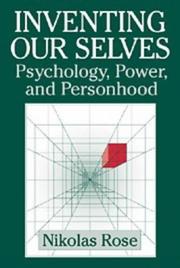| Listing 1 - 4 of 4 |
Sort by
|

ISBN: 0521659051 0521650755 9780521650755 9780521659055 9780511488856 1107116996 0511172281 0511004680 0511310153 0511150407 0511488858 1280420545 0511052189 9780511004681 9780511052187 9780511150401 0849391180 9780849391187 9786610420544 6610420548 Year: 1999 Publisher: Cambridge, United Kingdom ; New York, NY : Cambridge University Press,
Abstract | Keywords | Export | Availability | Bookmark
 Loading...
Loading...Choose an application
- Reference Manager
- EndNote
- RefWorks (Direct export to RefWorks)
Powers of Freedom, first published in 1999, offers a compelling approach to the analysis of political power which extends Foucault's hypotheses on governmentality in challenging ways. Nikolas Rose sets out the key characteristics of this approach to political power and analyses the government of conduct. He analyses the role of expertise, the politics of numbers, technologies of economic management and the political uses of space. He illuminates the relation of this approach to contemporary theories of 'risk society' and 'the sociology of governance'. He argues that freedom is not the opposite of government but one of its key inventions and most significant resources. He also seeks some rapprochement between analyses of government and the concerns of critical sociology, cultural studies and Marxism, to establish a basis for the critique of power and its exercise. The book will be of interest to students and scholars in political theory, sociology, social policy and cultural studies.
#SBIB:324H20 --- 321.01 --- 321.01 Algemene staatsleer. Politieke filosofie. Staatsleer. Staatstheorie --- Algemene staatsleer. Politieke filosofie. Staatsleer. Staatstheorie --- Politologie: theorieën (democratie, comparatieve studieën….) --- Communautés --- #PBIB:2003.3 --- Communities --- Liberty --- Political sociology --- Mass political behavior --- Political behavior --- Political science --- Sociology --- Civil liberty --- Emancipation --- Freedom --- Liberation --- Personal liberty --- Democracy --- Natural law --- Equality --- Libertarianism --- Social control --- Community --- Social groups --- Sociological aspects --- Foucault, Michel, --- Foucault, M. --- Political philosophy. Social philosophy --- Political sociology. --- Sociologie politique --- Liberté --- Foucault, Michel --- Liberty. --- Communities. --- Politieke filosofie. --- Fūkūh, Mīshīl, --- Foucault, Michael, --- Fuko, Mišel, --- Pʻukʻo, --- Pʻukʻo, Misyel, --- Phoukō, Misel, --- Fuke --- 福柯 --- Fuḳo, Mishel, --- Sociologie politique. --- Liberté. --- Communautés. --- Social Sciences --- Contributions in political science.

ISBN: 0521434149 0521646073 9780521434140 9780521646079 9780511752179 0511752172 Year: 1996 Publisher: Cambridge : Cambridge University Press,
Abstract | Keywords | Export | Availability | Bookmark
 Loading...
Loading...Choose an application
- Reference Manager
- EndNote
- RefWorks (Direct export to RefWorks)
Inventing Our Selves proposes a radical new approach to the analysis of our current regime of the self, and the values of autonomy, identity, individuality, liberty, and choice that animate it. It argues that psychology, psychiatry, psychotherapy and other 'psy' disciplines have played a key role in 'inventing our selves', changing the ways in which human beings understand and act upon themselves, and how they are acted upon by politicians, managers, doctors, therapists, and a multitude of other authorities. These mutations are intrinsically linked to recent changes in ways of understanding and exercising political power, which have stressed the values of autonomy, personal responsibility, and choice. This critical history diagnoses and destabilises our contemporary 'condition' of the self, to help us think differently about the kind of persons we are, or might become.
Identity (Psychology) --- Psychology --- Self --- 316.63 --- Personal identity --- Consciousness --- Individuality --- Mind and body --- Personality --- Thought and thinking --- Will --- Ego (Psychology) --- Behavioral sciences --- Mental philosophy --- Mind --- Science, Mental --- Human biology --- Philosophy --- Soul --- Mental health --- 316.63 Sociaal bewustzijn. Zelfconcept --- Sociaal bewustzijn. Zelfconcept --- Philosophy&delete& --- History --- Social aspects --- Developmental psychology --- Identidade (psicologia). --- Identiteit. --- Identity (Psychology). --- Identité (Psychologie). --- Moi (Psychologie) - Aspect social. --- Moi (Psychologie) --- Moi (Psychologie). --- Psicologia (filosofia;história e crítica). --- Psicologia social. --- Psychologie - Philosophie - Histoire. --- Psychologie --- Psychologie. --- Selbst-Psychologie. --- Self. --- Zelf. --- Aspect social. --- Philosophie --- Histoire. --- History. --- Philosophy. --- Social aspects. --- Identité (Psychologie) --- Aspect social --- Histoire --- Identité (psychologie) --- Individu et société --- Identité (psychologie) --- Individu et société. --- Arts and Humanities
Book
ISBN: 9780745641010 9780745641003 0745641016 0745641008 Year: 2008 Publisher: Cambridge : Polity,
Abstract | Keywords | Export | Availability | Bookmark
 Loading...
Loading...Choose an application
- Reference Manager
- EndNote
- RefWorks (Direct export to RefWorks)
Economic policy. --- Social policy. --- Politique économique --- Politique sociale --- Power (Social sciences) --- Economic policy --- Social policy --- 316.4.052 --- 338 --- 316 --- Integrerende processen. Sociale controle. Sociale sancties --- Economische situatie. Economische structuur van bepaalde landen en gebieden. Economische geografie. Economische produktie.economische produkten. Economische diensten --- Sociologie --(algemeen) --- 316 Sociologie --(algemeen) --- 338 Economische situatie. Economische structuur van bepaalde landen en gebieden. Economische geografie. Economische produktie.economische produkten. Economische diensten --- 316.4.052 Integrerende processen. Sociale controle. Sociale sancties --- Politique économique --- Gouvernement (science politique) --- Administration publique --- Approche théorique --- Approche théorique
Book
ISBN: 1299051367 1400846331 9781400846337 9780691149608 0691149607 9780691149615 0691149615 9781299051362 Year: 2013 Publisher: Princeton : Princeton University Press,
Abstract | Keywords | Export | Availability | Bookmark
 Loading...
Loading...Choose an application
- Reference Manager
- EndNote
- RefWorks (Direct export to RefWorks)
The brain sciences are influencing our understanding of human behavior as never before, from neuropsychiatry and neuroeconomics to neurotheology and neuroaesthetics. Many now believe that the brain is what makes us human, and it seems that neuroscientists are poised to become the new experts in the management of human conduct. Neuro describes the key developments--theoretical, technological, economic, and biopolitical--that have enabled the neurosciences to gain such traction outside the laboratory. It explores the ways neurobiological conceptions of personhood are influencing everything from child rearing to criminal justice, and are transforming the ways we "know ourselves" as human beings. In this emerging neuro-ontology, we are not "determined" by our neurobiology: on the contrary, it appears that we can and should seek to improve ourselves by understanding and acting on our brains. Neuro examines the implications of this emerging trend, weighing the promises against the perils, and evaluating some widely held concerns about a neurobiological "colonization" of the social and human sciences. Despite identifying many exaggerated claims and premature promises, Neuro argues that the openness provided by the new styles of thought taking shape in neuroscience, with its contemporary conceptions of the neuromolecular, plastic, and social brain, could make possible a new and productive engagement between the social and brain sciences. Copyright note: Reproduction, including downloading of Joan Miro works is prohibited by copyright laws and international conventions without the express written permission of Artists Rights Society (ARS), New York. ?
Neuropsychology. --- Neurophysiology --- Psychophysiology --- Neuropsychology --- brein --- hersenen --- neurowetenschappen --- Brain --- Neurosciences --- cerveaux --- neurosciences --- methods --- physiopathology --- Neuropsychologie --- Cognitive psychology --- amygdala. --- animal experiments. --- animal models. --- artificiality. --- behavioral research. --- biological processes. --- brain activation. --- brain function. --- brain imaging data. --- brain imaging. --- brain science. --- brain size. --- brain structure. --- clinical medicine. --- cognition. --- criminal conduct. --- criminal justice system. --- emotion. --- environmental influences. --- evolution. --- functional brain imaging. --- gene expression. --- genomics. --- human antisocial behavior. --- human behavior. --- human brain. --- human cognition. --- human sciences. --- mental illness. --- mental life. --- mental processes. --- mental states. --- molecules. --- mouse brain. --- nerve development. --- nervous system. --- neural activity. --- neural mechanisms. --- neuroaesthetics. --- neurobiological evidence. --- neurobiological self. --- neurobiology. --- neuroeconomics. --- neuromolecular brain. --- neuron regeneration. --- neuronal circuits. --- neuropsychiatry. --- neuroscience. --- neurotheology. --- orbital frontal cortex. --- plastic brain. --- plasticity. --- psychiatric classification. --- psychiatric diagnosis. --- psychiatric disorders. --- psychiatric research. --- psychiatry. --- psychology. --- reductionist approach. --- risk assessment. --- risk management. --- risk reduction. --- self-management. --- self-understanding. --- selfhood. --- social brain hypothesis. --- social brain. --- social groups. --- social sciences. --- sociality. --- somatic individuality. --- synaptic plasticity. --- temporal cortex. --- volition.
| Listing 1 - 4 of 4 |
Sort by
|

 Search
Search Feedback
Feedback About UniCat
About UniCat  Help
Help News
News